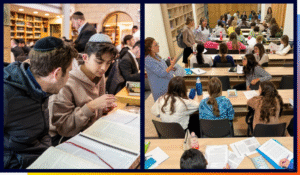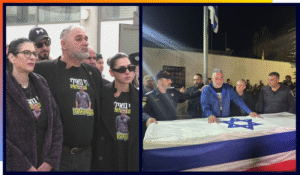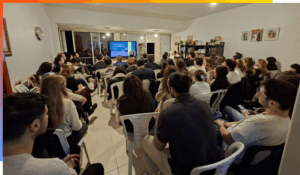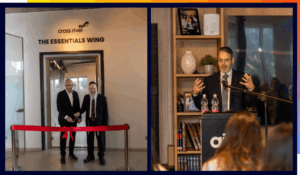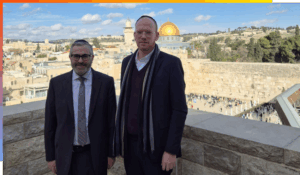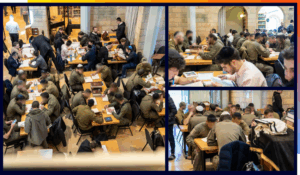In general I use our conversations as a means to explain and discuss the Aish movement. In general I don’t discuss my personal life. Not on social media or here. Some of our consultants have told me that I should open more of a window to my personal life to become more real on social media. I ascribe to the school of thought that one’s immediate personal life experiences should be kept close to the heart and not on widespread display. I want to make an exception in the case of sharing with you my journey through the kaddish prayer.
As many of you know, my father passed away last Rosh HaShana. With his passing, I began a journey that lasted eleven months and ended this past Sunday. My father was the ‘King of Minyan.’ Many times as a boy I recall my father on the street in front of his shul trying to find a tenth man. As a congregational Rabbi, he felt a shul is defined by its minyan (quorum.) There must always be a daily minyan no matter what the weather or circumstances. He would never shy away from asking anyone passing by if they were Jewish and if they could complete the minyan. When we would get nine, he would send us across the street to the Shell gas station to get Jordan the owner to complete the minyan. On Yom Kippur during the closing prayers of Neilah, he would ask the different members of the daily minyan to take turns standing by the ark because it was in their merit that the shul would be judged by the Almighty for a good year.

It was in this context that I felt the ultimate tribute that I could give my father would be to make sure to say kaddish three times a day with a minyan. This was easier said than done given my travel schedule. Many Rabbis informed me that due to my work on behalf of the Jewish community it would be okay to miss if necessary. I am also blessed to have an amazing brother who would never miss a kaddish. I had no doubt that I could rely on an exemption from time to time, yet in my heart and soul I knew that as this was the last concrete task I could do for my father. I couldn’t take the easy way out.
Flying to Israel turned into an anxiety-filled mission every few weeks. It is impossible to travel to Israel from the US without praying on the plane. The minyanim on the plane are not without some controversy. Many just pray from their seats as they find it very hard to participate in a minyan in flight, and others think it’s overly distracting to the other passengers. I decided that I would have others say kaddish for me and I would see what happened on each flight. Thankfully, one way or another I was able to say kaddish on every flight to Israel. Once, I rushed to the airport right after Shabbat and it didn’t look like there were enough people to make a minyan. Just as I resolved to accept my fate, someone tapped me on the shoulder, told me that he was saying kaddish, and asked if would mind helping him make a minyan. Truly an emissary from above!

I resolved not to travel internationally with the exception of Israel, until I was finished with kaddish. This meant that places like South Africa (where I am now writing this email) and Latin America would have to wait. Then I received a call from my close friend Avi Jorisch. He was leading a mission to Bahrain and Saudi Arabia. Avi wanted me to come to provide a rabbinic presence on the trip. I told Avi my predicament regarding kaddish. I will never forget Avi telling me, “Rabbi Burg, we will get you kaddish. I don’t know how exactly, but we will make it happen.” With Avi’s encouragement, and the knowledge that this mission was important for Israel and the Jewish Nation, I went. Avi was true to his word. I was able to say kaddish wherever we went. I can’t begin to put into words how amazing my fellow participants were on that mission. Regardless if they personally prayed every day, they became relentless in making sure that I had a minyan to say kaddish.

The highlight of that trip was going to Medina. They have only recently started to permit non-Muslims into the city. We went as a group, meeting with local representatives to get a better understanding of the Saudi people. After lunch in the hotel, we gathered to pray Mincha. At the end I said Kaddish with my two close friends Avi Levy and Josh Malkin who had also recently lost relatives. We realized that this was probably the first kaddish being said in Medina since the Jews left 1300 years ago. We were all visibly moved. I just kept thinking how much my father would have loved it.
There is no doubt that losing a loved one is a bit of a conundrum for a believing Jew. On the one hand, we acknowledge that this world is a temporary dwelling place for us to do good deeds on behalf of the Almighty, and the real world is the World to Come where our souls return to Him. There is no doubt that my father, after a life in service of his Father in Heaven, is there and looking out for all of us. At the same time, we experience immense pain at not having our loved ones here with us. Is that pain a lack of faith? I don’t believe so.

The pain stems from knowing that there was someone who lived in this world who loved us unconditionally. Who, no matter what, was always there to give us a kiss and a hug. Who selflessly cared for us expecting nothing in return. This type of loss has a tendency to leave us a bit broken. Saying kaddish three times a day and reminding ourselves that our beloved is with the Almighty strengthens us. Our loved one is not only not suffering, but thriving next to the Almighty.
As kaddish comes to an end we must realize that every action that we take, every thoughtful conversation that we have, every good deed committed, is the result of those that came before us and loved us. There is a beautiful word for this in Hebrew: mesora. This literally means “to pass on.” This is how we live eternally and continually in this world; by passing on our tradition to the next generation. My father will live on through his eighteen grandchildren. May we all continue to value and love those closest to us. May the Almighty continue to allow our departed loved ones to advocate and uplift us all.


